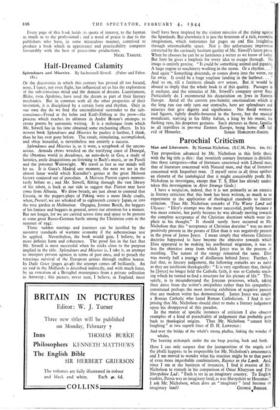Parochial Criticism
Man and Literature. By Norman Nicholson. (S.C.M. Press. ros. 6d.)
THE proposition advanced by Mr. Nicholson in this little thesis with the big title is this : that twentieth century literature is divisible into three categories—that of literature concerned with Liberal man, that of literature concerned with Natural man, and that of literature concerned with Imperfect man. (I myself sense in all three epithets an element of the tautological that it might conceivably profit Mr. Nicholson to investigate, except that T. SEliot has already undertaken this investigation in After Strange Gods.) I have a suspiciun, indeed, that it is not primarily, as an exercise in literary criticism that this book has been written, so much as an experiment in the application of theological standards to literary criticism. Thus Mr. Nicholson remarks of The Waste Land and Ulysees: "Elioes attemptwas the more successful, partly because it was more concise, but partly because he was already moving. towards the complete acceptance of the Christian doctrines which were implicit in his thought." It should surely have occurred to Mr. Nicholson that this "acceptance of Christian doctrine" was no more positively present in the poems of Eliot than it was negatively present in the prose of James Joyce. I mean simply that whereas Christian doctrine happened to have become the objective towards which Eliot appeared to be making his intellectual migration, it was no less the objective away from which Joyce was in the process of recoiling. The nature of the energy remained the same. Eliot was merely half a journey of disillusion behind Joyce. Further, I feel that, as literary judgement, the following remarks are as naive as they are intolerant theologically : "It is very significant that, theugh he [Joyce] no longer held the Catholic faith, it was to Catholic teaching which he turned to find a structure for his picture of life." This, surely, is to misunderstand the Joycean processes, which, taking their drive from the writer's antipathies rather than his sympathies, constituted perhaps the most moving exhibition of negative passion that any modern writer has demonstrated. James Joyce was simply a Roman Catholic who hated Roman Catholicism. I find it surprising that Mr. Nicholson should elect to make a literary judgement upon his disapproval of this paradox.
In the matter of specific instances of criticism I also observe examples of a kind of parochiality of judgement that probably goes back to theological origins. Thus Mr. Nicholson "cannot help laughing" at two superb lines of D. H. Lawrence:
And over the bridge of the whale's strong phallus, linking the wonder of whales,
The burning archangels under the sea keep passing, back and forth.
Here I can only suspect that the juxtaposition of the angels and the phalli happens to be responsible for Mr. Nicholson's amusement; and I am moved to wonder what his reaction might be to that poem of even more improbable combinations, Rejoice in the Lamb. And, since I am at the business of instances, I find it evasive of Mr. Nicholson to remark in his comparison of Omar Khayyam and The Shropshire Lad: "Each is set in an imaginary country. To English readers, Persia was an imaginary land, as was Shropshire to Housman." I ask Mr. Nicholson, when does an " imaginary " land become an imaginary land? GEORGEaBARICER.






















 Previous page
Previous page